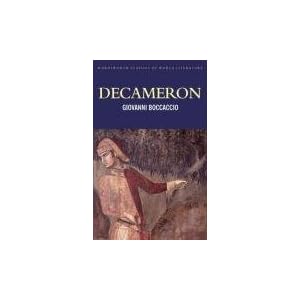 --The blurb--
--The blurb--"1348. The Black Death is sweeping through Europe. In Florence, the plague has carried off one hundred thousand people. In their Tuscan villas, seven young women and three young men tell tales to recreate the world they have lost, weaving a rich tapestry of comedy, tragedy, ribaldry and farce."
--The review--
At around 700 pages, modern readers often expect an unreadable epic that is trapped in the past in which it was created. What you are treated to with The Decameron, however, is a relatively accessible collection of one hundred short stories, which can be enjoyed at your leisure and in a similar manner to Bible stories (mostly minus the preaching): anybody expecting something boring is proved wrong with the collection of thoroughly engaging thrills, chills and spills.
The project is an obviously ambitious undertaking, and it would be unreasonable to expect something of this magnitude to succeed entirely. For one thing, it is impossible, even having read all of the short stories, to remember the details of each and every one. Some of the longer stories also fail to hold the reader's interest: this is not necessarily because they are long (Boccaccio himself, at the end of the short stories, defends in his conclusion the inclusion of the longer stories by simply saying "well, if you had anything better to do, you wouldn't be reading any of these stories at all - long OR short", which seems fair enough) but because they are tedious. By their nature, the shorter stories are snappier and more concise, and in any case, even if all of the stories were of exactly the same length, it would be difficult for any author to sustain their prowess equally across such a large number of stories.
Content-wise, some of the stories can also become repetitive: the vast majority involve adultery of some kind, and the confusion of lust for love by our naive Italian forefathers. Lust and love are treated interchangeably and for the modern reader this can become wearying or frustrating. However, Boccaccio is an absolute master of the witty comeback and most of the stories are not boring at all. The predecessor of Keats' poem Isabella, or the Pot of Basil, was very illuminating to read in its original prose form, and the very first story of the collection, about a saint whose behaviour was so appalling that he should never have really been one in the first place, carries many fascinating implications about the foundations of religion.
Even though the stories are not always beautifully or tersely written, quite often Boccaccio's surrounding descriptions are, and the structure of smaller stories within a larger framework is refreshing and accessible, even if we do not really get to know the storytellers themselves very well at all (they are portrayed as mere vessels for the stories, which are the real stars of the show). The breadth and detail of content means this is a collection that readers can return to over and over again; it is easy to see how the process of getting to know the stories one by one could become a real pleasure.
Other works by Giovanni Boccaccio
The Crow (c.1365)
On Famous Women (c.1375)
The Elegy of Lady Fiammetta (c.1343)
The Filocolo (c.1336)
The Filostrato (c.1340)
Teseida (c.1341)
On The Fates of Famous Men (c.1355)





No comments:
Post a Comment